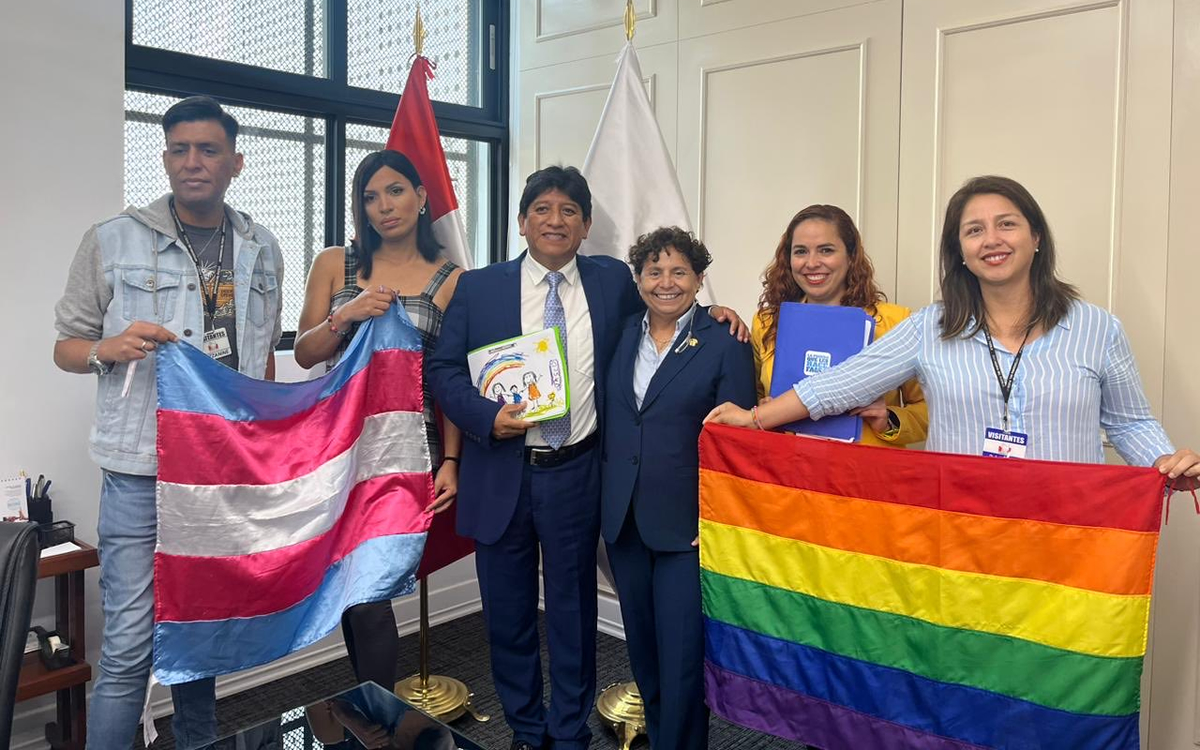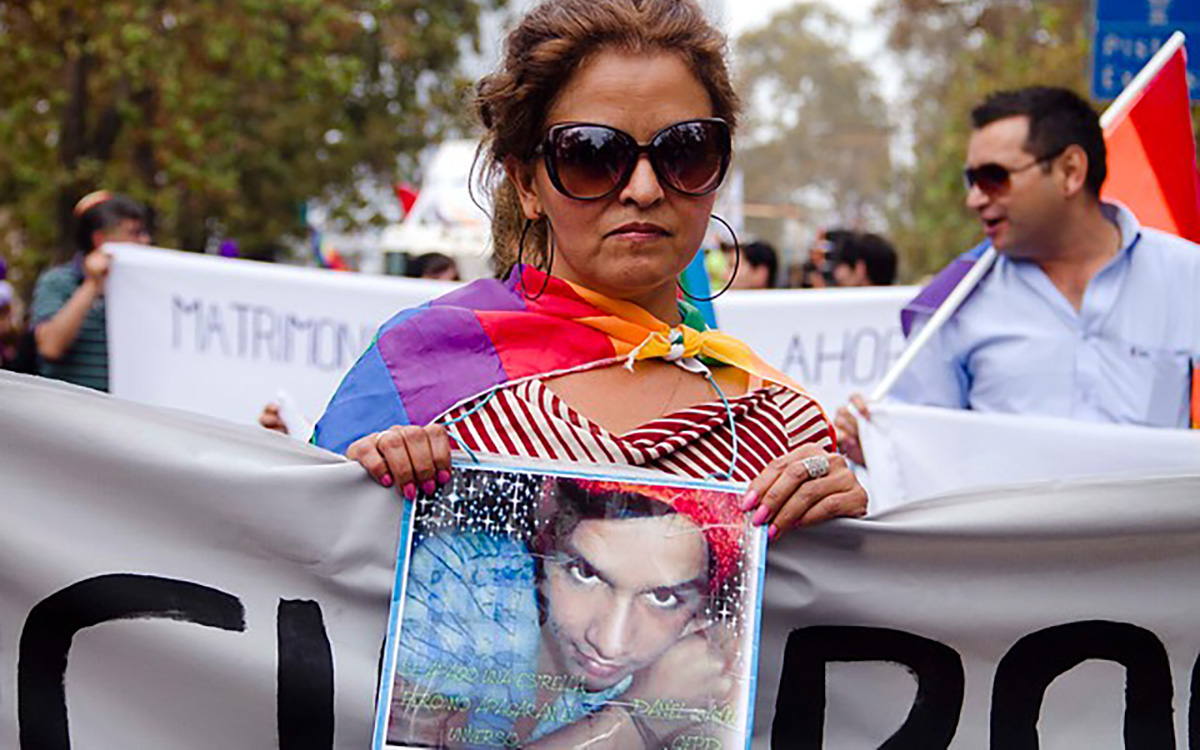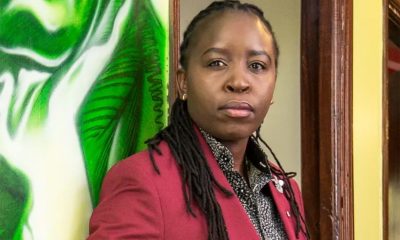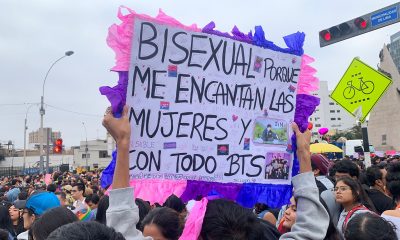South America
Peru’s new ombudsman makes homophobic comments before Congress
Josué Manuel Gutiérrez Cóndor elected on May 17

CUSCO, Peru — Peru on May 17 elected a new ombudsman.
The office of Peru’s ombudsman, or “Defensor del Pueblo,” was created in 1993. The ombudsman’s website says this autonomous office’s role is to “defend and promote the individual and communal rights,” with an emphasis on the rights of vulnerable peoples. Some of the powers of this office include presenting amicus curiae briefs and even bills to Peru’s Congress.
Given the powers and responsibilities of this position, the ombudsman is of particular relevance to Peru’s queer community. And on May 17 of this year, Congress by an 88-24 vote margin elected Josué Manuel Gutiérrez Cóndor, a lawyer and former congressman, to be Peru’s new ombudsman.
Shortly after his appointment, though, it became known that Gutiérrez during his election process before Congress made remarks that some are calling homophobic.
Conservative Congressman Alejandro Muñante asked Gutiérrez about “Lesbian Visibility Day.” Gutiérrez, in his response, said although he is a “lover of freedoms,” he also called homosexuality a “deformity that needs to be corrected.”
“These deformities are debaucherous … these deformities don’t contribute to institutions or the state, therefore this behavior must be corrected and not idealized,” added Gutiérrez.
Jorge Apolaya, a spokesperson for the Lima Pride March Collective, spoke with the Washington Blade over WhatsApp about the historic importance of Peru’s ombudsman in the fight for LGBTQ and intersex rights.
“The ombudsman’s office is an entity that contributes to guaranteeing the rule of law in the search for justice … and the LGBT population has often had to resort to [the ombudsman] in order to achieve greater attention to their demands,” said Apolaya. “So it’s necessary for the country to have strengthened institutions because only in this way will we be able to advance the human rights of all people, especially the most vulnerable populations in the country.”
It is perhaps due to the importance of this office that, despite Gutiérrez’s apparent homophobia, Peru’s first and only lesbian congressman, Susel Paredes, met with Gutiérrez. With rainbow and transgender flags sprawled across the table, the congresswoman and Gutiérrez on May 29 spoke about issues affecting the LGBTQ and intersex community in Peru.
After the meeting, Paredes posted on Twitter:
“Meeting with the ombudsman, Josué Gutiérrez. This isn’t a blank check. He already committed to a solution for the children of same-sex families. The update of Report 175 on the rights of the LGBTIQ+ community and supporting the Pride March are also part of the commitments.”
Reunión con el Defensor del Pueblo, Josué Gutiérrez. No es un cheque en blanco. La solución de l@s hij@s de familias homoparentales ya es un compromiso. También lo son la actualización del Informe 175 sobre derechos de la comunidad LGBTIQ+ y el apoyo la Marcha del Orgullo.✍️🏳️🌈🏳️⚧️ pic.twitter.com/FeqgN5XoZQ
— Susel Paredes (@suselparedes) May 29, 2023
The above-tweet refers to Gutiérrez’s supposed commitments to help resolve the situation of gay and lesbian parents who can’t register their children as their own under Peruvian law (with both of their surnames,) and the role of the ombudsman to create a report on the situation of LGBTQ and intersex people in Peru.
Not everyone, however, was convinced by the ombudsman’s promises so soon after his homophobic appearance before Congress.
Replying to Paredes’ tweet, Peruvian human rights activist Gabriel Moreno Alcántara, wrote: “Still, we can’t trust him one bit. Right now he is new so he is going to want to be liked by all social groups.” (Paredes liked the tweet.)
Apolaya, though, tells the Blade that he doesn’t fault the congresswoman for having the meeting with Gutiérrez as it is part of the duties of her office to meet with officials like him.
“I think that [the meeting] was an opportunity for the ombudsman to learn about the demands of LGBTI people in the country.”
U.S. Ambassador to Peru Lisa Kenna also met with Gutiérrez.
She tweeted on June 7 that “everyone has the right to fundamental freedoms. I spoke with the Ombudsman Josué Gutiérrez to express our support for the defense of human rights and democracy in Peru.”
Todos, todas y todes tienen el derecho a libertades fundamentales. Conversé con el Defensor del Pueblo Josué Gutiérrez para expresar nuestro apoyo para la defensa de los derechos humanos y la democracia en 🇵🇪@Defensoria_Peru pic.twitter.com/y4Gf5ydVkm
— Lisa Kenna (@USAmbPeru) June 7, 2023
This tweet attracted some backlash from both liberal and conservative Peruvians.
Some conservatives took issue with the ambassador’s use of the word “todes,” a gender-neutral word for “everyone” that does not exist in traditional Spanish. Muñante replied to the tweet, writing “‘todes’” does not exist in our language, Madam Ambassador, be careful with the image you project in our country.”
In one of South America’s most conservative countries, the controversies surrounding Gutiérrez’s appointment are indicative of the ongoing struggle for LGBTQ and intersex rights.
Peru remains one of the few countries in South America which offers zero recognition for same-sex couples, despite a 2018 Inter-American Court of Human Rights ruling which mandates that signatories of the American Convention on Human Rights to legalize same-sex marriage. And in one of the areas Paredes brought up in her meeting with Gutiérrez, same-sex parenting, public opinion greatly lags behind other countries in the region.
According to a 2021 Ipsos study, a majority of Peruvians disagreed with the statement that “same-sex couples should have the same rights to adopt children as heterosexual couples do.” Further, in a 2023 survey (also by Ipsos), 98 percent of LGBTQ people responded that they were either “extremely” or “very” dissatisfied with “the role of the State in guaranteeing rights of diverse families/LGBTIQA+ people.” Fifty-six percent of respondents also reported having experienced discrimination in public spaces.
Despite the widespread discrimination and the suspicions of some in Peru’s queer community of Gutiérrez’s true intentions, plans for Pride continue unabated.
Apolaya tells the Blade that the Lima Pride March, which will take place on July 1, is expecting around 25,000 participants. Other towns in Peru will also be hosting their first-ever Pride festivities.
Juliaca, the town where 18 protesters and bystanders were killed in a single day during the political unrest earlier this year, will host a march on June 28.
South America
Argentina government dismisses transgender public sector employees
Country’s Trans Labor Quota Law enacted in 2021

Protests have broken out across Argentina in recent weeks after the dismissal of transgender people from their government jobs.
President Javier Milei’s action is in stark contract with the progress seen in 2023, where the government’s hiring of trans people increased by 900 percent within the framework of the Trans Labor Quota Law that had been in place since 2021.
Among those affected is Sofia Diaz, a “survivor” who shared her testimony with the Washington Blade hours after she traveled from Chaco Province to Buenos Aires to protest her dismissal.
Presentes, an LGBTQ news agency, reported the government dismissed more than 85 trans employees in less than two weeks.
Diaz, 49, holds a degree in combined arts. She joined the National Social Security Administration (ANSES) in 2022 under the Trans Labor Inclusion Law. The layoffs began in January and left many people feeling uncertain and anguished. It was her turn a few days ago.
Diaz in an interview recounted how the situation became progressively more complicated, with difficulties in accessing information about her employment status and the eventual confirmation of dismissals through WhatsApp messages. This government action, according to Diaz, violates the law.
“We were on a Friday, I think on March 24, in the office and we have a WhatsApp group of other colleagues from all over Argentina who entered through the trans labor quota and they tell us if we can get our pay stubs on the intranet,” Diaz recalled. “So, I tried to enter, I could not, I talked to two other colleagues and they told me no, they could not, and so we went to another person. He couldn’t either.”
“Some people told us that it could be a system error. Well, we were never calm, let’s say not how this issue of installing fear and the perversion with which they do it ends,” she added. “This sadism of … inflicting pain and speculating with your misfortune and so on … is something that characterizes Javier Milei’s government.”
Diaz recalled a list of those dismissed from the agency began to circulate from the union in the afternoon. A colleague passed it on to her, “and well, unfortunately I was also on that list.”
“At that moment the whole weekend went by with anguish, crying, and talking with other colleagues from other places, not only trans, but everyone, everyone and everyone,” she said. “On Monday when we went to try to enter, we could not enter with the biometric, which is the thumb we had to use every morning to enter.”
Despite the difficult moment through which she is going, the trans activist stressed to the Blade that she will continue protesting and will even sue the government because her dismissal is illegal and “violates the constitution itself.”
The LGBTQ community and its allies have mobilized and organized demonstrations, highlighting the importance of defending the rights won and fighting against discrimination and exclusion. Diaz emphasized the fight is not only for the people affected today, but also for future generations, saying the historical memory of the struggles for inclusion and social justice must be kept alive.
“The Argentine government thus faces a key challenge in human and labor rights, where public pressure and social mobilization can play a determining role in protecting the rights of LGBTQ+ people,” Diaz said.
South America
Daniel Zamudio murderer’s parole request denied
Raúl López Fuentes convicted of murdering gay man in Chilean capital in 2012

Chile’s Parole Commission on Tuesday rejected a request to allow one of the four men convicted of murdering Daniel Zamudio in 2012 to serve the remainder of his sentence outside of prison.
Raúl López Fuentes earlier this month asked the commission to release him on parole. Zamudio’s family and members of the Movement for Homosexual Integration and Liberation, a Chilean LGBTQ rights group, had gone to court to block the request.
Among the arguments put forward that influenced the commission’s decision is what Movilh categorized as his “high risk of recidivism, linked to the adherence of an antisocial behavior with a tendency to minimize his acts transgressing social norms.”
The commission pointed out that López has psychopathic traits because he is aware of the damage he did to Zamudio and his family.
“In addition, he maintains a high risk of violence, not being advisable to grant the benefit,” the report said.
Zamudio was a young Chilean man who became a symbol of the fight against homophobic violence in his country and around the world after López and three other young men with alleged ties to a neo-Nazi group beat him for several hours in Santiago’s San Borja Park on March 2, 2012. Zamudio succumbed to his injuries a few weeks later.
The attack sparked widespread outage in Chile and prompted a debate over homophobia in the country that highlighted the absence of an anti-discrimination law. Lawmakers in the months after Zamudio’s murder passed a law that bears Zamudio’s name.
López in 2013 received a 15-year prison sentence after he was convicted of killing Zamudio. Patricio Ahumada received a life sentence, while Alejandro Angulo Tapia is serving 15 years in prison. Fabían Mora Mora received a 7-year prison sentence.
Zamudio’s mother, Jacqueline Vera, exclusively told the Washington Blade after the commission rejected López’s request that “we as a family are calmer.”
“Even with my husband we were in a lot of pain at the beginning. It was like a blow of very strong emotions, so we tried to stay calm because we still had to solve the problem,” Vera said. “We had four days to solve it.”
López will have to serve the remaining three years of his sentence before his release.
“I will continue working to improve the Zamudio Law and so that this murderer does not leave prison because he is a danger to society, he does not represent repentance and people like this cannot be free,” she said. “For the same reason, we have to work so that hate crimes have life imprisonment and that is what we will concentrate on.”
South America
Man convicted of killing Daniel Zamudio in Chile seeks parole
Raúl López Fuentes in 2013 sentenced to 15 years in prison

One of the four men convicted of murdering a young gay man in the Chilean capital in 2012 is seeking parole.
Raúl López Fuentes in 2013 received a 15-year prison sentence after he was convicted of killing Daniel Zamudio.
Zamudio was a young Chilean man who became a symbol of the fight against homophobic violence in his country and around the world after López and three other young men with alleged ties to a neo-Nazi group beat him for several hours in Santiago’s San Borja Park on March 2, 2012. Zamudio succumbed to his injuries a few weeks later.
The attack sparked widespread outage in Chile and prompted a debate over homophobia in the country that highlighted the absence of an anti-discrimination law. Lawmakers in the months after Zamudio’s murder passed a law that bears Zamudio’s name.
Patricio Ahumada received a life sentence, while López and Alejandro Angulo Tapia are serving 15 years in prison. Fabían Mora Mora received a 7-year prison sentence.
López has asked the Seventh Santiago Guarantee Court to serve the last three years of his sentence on parole. Zamudio’s family and Jaime Silva, their lawyer who works with the Movement for Homosexual Integration and Liberation, oppose the request.
Movilh represented Zamudio’s family after his murder.
Zamudio’s mother, Jacqueline Vera, during an exclusive interview with the Washington Blade said López’s petition “provoked all the anguish, all the commotion of his time.”
“It was very cruel because in fact two days before we were at Daniel’s grave, where it was 12 years since his death and the beating,” said Vera. “He really does not deserve it.”
“We have gone through very difficult moments,” she added.
The mother, who later created a foundation to eradicate discrimination in Chile, was emphatic in indicating that she and her family “do not accept the release of this guy because he is a danger to society and a danger to ourselves.”
“At the last hearing where they were sentenced, they told us that we are going to remember them when they get out,” said Vera. “They threatened us with death. There is a video circulating on social networks where they were in front of me and they laughed and made fun of me. They told me that I remembered that I had three more children.”

Regarding the possibility that the Chilean justice system will allow López to serve the remaining three years of his sentence on parole, Vera said “with the benefits here in Chile, which is like a revolving door where murderers come and go, it can happen.”
“In any case, I don’t pretend, I don’t accept and I don’t want (López) to get out, I don’t want (López) to get out there,” she said. “We are fighting for him not to get out there because I don’t want him to get out there. And for me it is not like that, they have to serve the sentence as it stands.”
LGBTQ Chileans have secured additional rights since the Zamudio Law took effect. These include marriage equality and protections for transgender people. Advocacy groups, however, maintain lawmakers should improve the Zamudio Law.
“We are advocating for it to be a firmer law, with more strength and more condemnation,” said Vera.
When asked by the Washington Blade about what she would like to see improved, she indicated “the law should be for all these criminals with life imprisonment.”
-

 District of Columbia4 days ago
District of Columbia4 days agoCatching up with the asexuals and aromantics of D.C.
-

 South America4 days ago
South America4 days agoArgentina government dismisses transgender public sector employees
-

 Maine5 days ago
Maine5 days agoMaine governor signs transgender, abortion sanctuary bill into law
-

 Mexico3 days ago
Mexico3 days agoMexican Senate approves bill to ban conversion therapy












